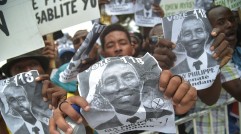FBI Interrogation Policy Change: Authorities to Record Video Statements of People in Custody
Last week, the U.S. Department of Justice issued a memo for the modification of the interrogation policy. With the new policy, the video of statements by people under the custody of the Federal Bureau of Investigation (FBI), the U.S. Marshals Service, the Drug Enforcement Administration, and the Alcohol, Tobacco and Firearms Bureau can be recorded before they appear in court.
During last Thursday's video address, Attorney General Eric Holder said that the modifications were made after conducting a comprehensive review. It was decided that recordings would give an "objective account of key investigations and interactions with people who are held in federal custody." The lifting of the ban on recordings has long been overdue and was long awaited by criminal defense lawyers, who have lobbied for it citing transparency purposes.
In a statement released last Wednesday, Jerry Cox, the National Association of Criminal Defense Lawyers president, stated that recording interrogations serves as protection for the accused. This will also help protect them from police brutality and misconduct, save law enforcers from fake accusations and will safeguard public safety.
However, recording will not be allowed in certain circumstances such as:
-
when recording is refused by the accused; or
-
if recording poses a threat to national or public safety.
The National Association of Criminal Defense Lawyers data showed that numerous national and local authorities in the U.S. are currently recording interrogations. The recording of interrogations is one of the most noteworthy modifications in the policies of the FBI that is currently headed by James B. Comey. Comey replaced Robert S. Mueller III in September as FBI director. The recording of interrogations was not approved by Mueller and the bureau's senior officials, who justified that it could divulge the interrogation tactics of agents.
The new FBI policy of recording interrogations will commence on July 11.
Subscribe to Latin Post!
Sign up for our free newsletter for the Latest coverage!














